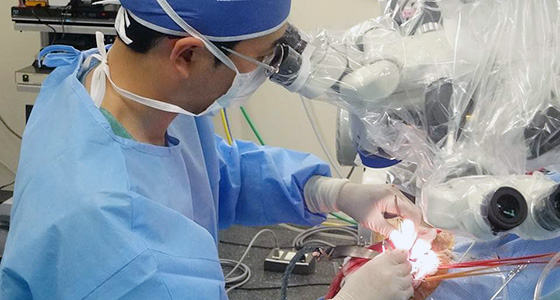- HOME
- Department
- Neurosurgery
-
Related Links
Neurosurgery

(1) Overview
We treat a variety of neurological disorders from chronic neurological disorders requiring specialized treatments such as brain tumours, to more acute cases requiring rapid treatments such as stroke and epileptic seizures.
Our core strength lies in our teamwork and we work closely with other departments such as the Gamma Knife Center, Cerebrovascular Medicine, and Neurology in order to provide the best possible care for the patients.
Our department performs over 400 surgeries* annually including
– Cerebrovascular disease such as subarachnoid hemorrhage, cerebral aneurysm, cerebral arteriovenous malformation and cerebral hemorrhage,
– Benign brain tumors such as acoustic tumors and meningioma,
– Malignant tumors such as glioma, metastatic brain tumors, trigeminal neuralgia, facial spasm, spinal cord tumors and spinal cord arteriovenous malformations.
*1 Total number of neurosurgeries from January 2021 to December 2021 was 417.
(2) Policy
We Value Patients-Centred Specialist Care
We strive to achieve better outcomes in the long term for our patients by providing safe, patient – centred approach. For example, our surgeries are performed by experienced surgeons while using electrophysiological monitoring and navigation system to monitor cerebral function under anesthesia in order to improve safety and accuracy of our surgeries.
(3) Our Strengths
Striving for Highly Accurate and Safe Surgeries
In brain surgery, it is important to minimize any damage to the healthy brain in order to optimize the postoperative function for the patients. We perform surgeries while identifying healthy brain tissues under a microscope, preserving as much healthy brain tissue as possible.
Our surgeons routinely practice surgeries using microscopes in order to perform highly accurate surgeries. Our surgeons undergo daily trainings to suture under microscopes using thread finer than human hair.
We Value Teamwork and Actively Collaborate With Other Team Members
For treatment of brain diseases, it is important to consider not only the diseases themselves, but also the social backgrounds such as the patient’s general condition and the social backgrounds such as home environment. We organize daily conference meetings in order to actively share information with other departments such as Neurology, Cerebrovascular Medicine, Rehabilitation, co-medical staff, and the social workers.
We Respond to Emergency Stroke Patients 24/7
We operate a stroke hotline system twenty four hours a day, seven days a week. We accept referals directly from neigbouring medical institutions and rescue teams in suspected cases of stroke, allowing smooth and quick treatments for the patients. We often perform emergency surgeries when those stroke cases are accepted by our stroke hotline.
Message for Our Patients
Our neurosurgery department often performs craniotomy (open surgery) under general anesthesia using microscopic techniques for conditions such as brain tumors and cerebral aneurysms.
We have experienced doctors, and focus on accumulating clinical skills, ensuring highly accurate and safe surgeries while minimizing the damage to the healthy brain.
Our Director of Neurosurgery, Dr Inoue, has a wealth of experience in all field of neurosurgeries. He has so far performed over 1,000 cases of open brain aneurysm clippings, 400 cases of open brain blood vessel bypass surgeries, 600 cases of cervical internal carotid artery thrombosis endarterectomies, 400 cases of craniotomy brain tumor resections, and 600 cases of craniotomies for removal of hematoma.
We receive an increasing number of referrals for more technical and delicate surgeries such as large brain aneurysm and brain tumors (including skull base brain tumor surgeries and acoustic neuroma surgeries), cerebral vascular anastomosis and cerebrovascular moyamoya disease.
We look forward to welcoming you to our department and please do not hesitate to consult us if you have any questions.
